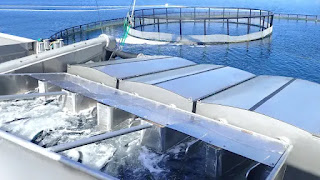Grieg Seafood BC, a salmon farming company based in Vancouver Island, announced its commitment towards reducing sea lice populations while at the same time reducing its chemical and medication use.
"Grieg has entered into a three-year contract with Njord Marine Service Ltd. for the service of the Coastal Server, a 24-metre all-purpose vessel which has also been fitted with a SkaMik 1.5 mechanical delousing system," Grieg Seafood BC said in a press release dated 21st December.
The vessel and equipped delousing system will be used by Grieg at its farms along the east and west coasts of Vancouver Island, where the company operates, and the Sunshine Coast for sea lice management.
The delousing system consists of soft, rotating brushing and low-pressure water nozzles as a means of removing sea lice, ensuring no chemical or medication use. The vessel will also be able to provide regular maintenance support in addition to delousing treatments.
The SkaMik system
"As an organisation, we are committed to reducing the overall impact from our operations. Sea lice remains one of the biggest issues, and the new vessel and SkaMik 1.5 system are a welcome addition to our toolbox as not only does the system remove over 97 per cent of sea lice, in all lifecycle stages, it uses no medication or chemicals," Rocky Boschman, the Managing Director for Grieg Seafood BC, said. "It captures the removed lice for disposal on land – reducing the overall lice population in the region."
The vessel and delousing system is capable of being used at all Grieg farms, due to being self-contained and able to travel easily between sites. The system can be used on fish of all sizes and able to treat up to 150 metric tonnes of fish per hour. The treatment time per fish is about 1.5 seconds.
"The new mechanical delouser will be our first choice for sea lice treatment and will be a valuable addition to our fleet. The SkaMik 1.5 system uses ambient temperature ocean water and soft bristled brushes to loosen and remove lice, which are then filtered out of the treatment water for later disposal or composting on land," explained Dean Trethewey, Seawater Production, Certifications and Regulatory Director. "The process itself is incredibly quick – with each fish only spending about 1.5 seconds in the delousing system. This helps to reduce stress for the fish and enables us to treat entire farms within a matter of days with an immediate reduction of lice in the region."
When the Coastal Server and SkaMik 1.5 are available, Grieg is going to test and commission the vessel and delouser with the intention of having the system in use at all of the company's operations. Further plans are to arrange for tours of the vessel and celebrations next year, when pandemic restrictions are permitting.
For more information on Grieg Seafood BC visit their website, HERE.
For more information on Njord Marine Service visit their website, HERE.
Image credit: Grieg Seafood BC










